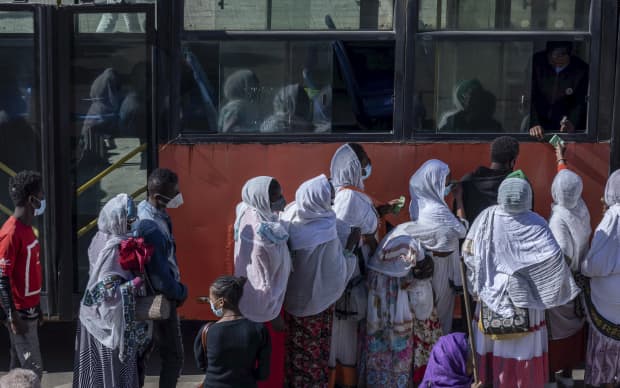
Passengers queue to get on a bus in the capital Addis Ababa, Ethiopia Friday. Ethiopia’s prime minister says airstrikes have been carried out against the forces of the country’s Tigray region, asserting that the strikes in multiple locations “completely destroyed rockets and other heavy weapons.”
AP
Ethiopia moved Saturday to replace the leadership in the country’s northern Tigray region, where clashes between regional forces and those of the federal government have led to fears that a major African power could slide into civil war. Neither side appeared to welcome the dialogue that experts say is needed to avert disaster.
The vote by the upper house of parliament, the House of Federation, to set up an interim administration needs no further approval, and it gives Prime Minister Abiy Ahmed the power to carry out the measures against a Tigray leadership his government regards as illegal.
Ethiopia’s federal government said the interim administration will “appoint officials, ensure the respect for rule of law, approve the region’s budget and facilitate the process of conducting elections.”
In a new statement Saturday, the Nobel Peace Prize-winning prime minister asserted that “criminal elements cannot escape the rule of law under the guise of seeking reconciliation and a call for dialogue.”
Experts and diplomats are watching in dismay as two heavily armed forces clash in one of the world’s most strategic yet vulnerable regions, the Horn of Africa. Observers warn that a civil war in Ethiopia, Africa’s second most populous country with 110 million people, could suck in or destabilize neighbors such as Sudan, Eritrea and Somalia.
A statement posted Saturday on the Facebook page of the Tigray government, the Tigray People’s Liberation Front, said it will win the “justified” war, and added that “a fighter will not negotiate with its enemies.”
“Tigray’s people are now armed with modern weaponry that could reach the seat of the infidels,” it added, an apparent reference to Ethiopia’s capital, Addis Ababa. There was no reference to Saturday’s move by the federal government.
The conflict in Tigray is playing out between former allies in Ethiopia’s ruling coalition who now see each other as illegal.
The TPLF long dominated the country’s military and government before Abiy took office in 2018 and introduced sweeping political reforms that won him the Nobel. Those change left the TPLF feeling marginalized, and it broke away last year when Abiy sought to turn the coalition into a single Prosperity Party.
Tensions rose in recent weeks as the Tigray region, objecting to the delay of the national election until next year and Abiy’s extended stay in office, held a local election in September that the federal government called illegal.
The fighting began early Wednesday when Abiy accused the TPLF forces of attacking a military base in Tigray. In a major escalation on Friday, Abiy announced that airstrikes in multiple locations around the Tigray capital “completely destroyed rockets and other heavy weapons” and made a retaliatory attack impossible.
The military operations will continue, the prime minister said, and he warned the Tigray population: ”In order to avoid unexpected peril, I advise that you limit group movements in cities.”
Communications remain almost completely severed with the Tigray region, making it difficult to verify either side’s assertions and leading to pleas from aid groups and human rights groups to restore internet and phone links.
They also warn of a brewing humanitarian disaster if the conflict continues, which experts warn is likely if the two sides reject talks.
Tigray is increasingly boxed in by Ethiopian federal forces and a six-month state of emergency imposed by the federal government that sharply curbs public gatherings and movement.
“If they come under pressure from the south, from Abiy Ahmed’s federal forces, then (the TPLF) may decide to make a strategic retreat or even punch into Eritrea, which would then internationalize this conflict,” Dino Mahtani with the International Crisis Group said in comments posted Friday. The TPLF and Eritrea have a bitter history of a long border war between Ethiopia and Eritrea before the countries made peace in 2018.
The TPLF’s only other real avenue out of Ethiopia is into Sudan, which finds itself “in a very delicate position,” Mahtani said. Sudanese Prime Minister Abdalla Hamdok has spoken by phone with a worried United Nations Secretary-General Antonio Guterres, the U.N. said Friday.
Sudan’s eastern al-Qadarif province has closed its border with Ethiopia’s Tigray and Amhara regions, the Sudan News Agency reported Saturday.
The Tigray drama dominates conversation in Ethiopia, and many people commenting on social media appear to support the government’s move to get rid of the region’s leadership. Some cite abuses by the TPLF while it was in power for well over two decades, or echo the federal government’s accusation that it incited recent violence across the country.
Those sympathetic to the TPLF are mostly silenced due to the communications blackout in Tigray, but those able to comment describe the federal government’s actions as an aggression that will lead to further escalation of the conflict.
